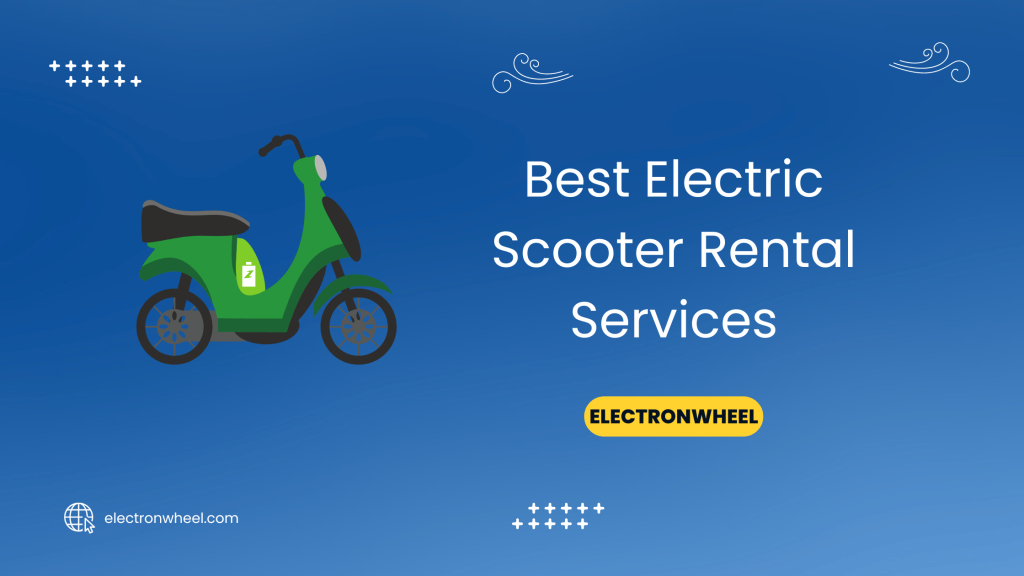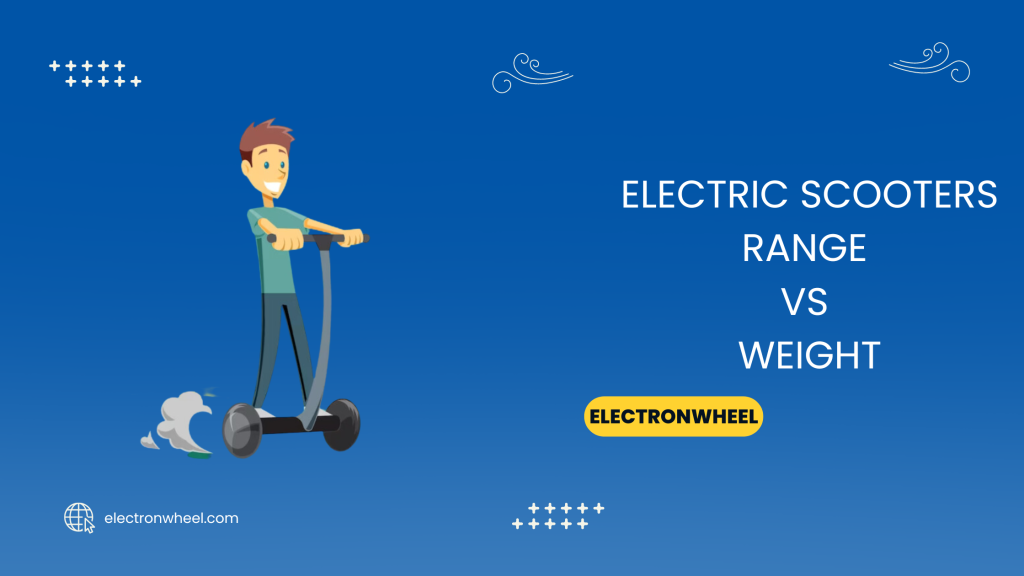This post contains affiliate links, we'll earn compensation if you make a purchase using them at no additional cost to you 😊
Currently valued at over $33 billion, the electric scooter market is booming as the globe relies more on green energy. While the growth is fascinating, there are many more things to the picture than just adaptation.
If you’re interested in learning more about electric scooters through numbers, you’re at the right post. We’ll cover the current state of electric scooters, their market size, the industry’s revenue, and much more through facts and statistics.
Let us get into it real quick, shall we?
Electric Scooter Statistics (Top Picks)
- The global electric scooter market size is expected to reach $41.98 billion by the end of 2030.
- Men make 75% of electric scooter trips in the United States.
- The electric scooter-sharing market’s revenue has reached $1,813 million.
- The E-scooter-sharing industry will have around 133.80 million users by 2027.
- 252 electric scooter systems are available in the United States as of 2024.
- Injuries related to using e-scooters, e-bikes, and hoverboards have increased by 70% over the past four years.
- It is projected that by 2028, there will be 129 million units of electric scooters and motorcycles on the roads.
- In 2023, 8% of all two-wheelers on the road are expected to be electric.
Market Size of Electric Scooters Statistics
- The global electric scooter market size is expected to reach $41.98 billion by the end of 2030.
The worldwide electric scooter market was valued at $33.18 billion in 2022 and is expected to show a compound annual growth rate (CAGR) of 9.9% from 2024 to 2030.
- The Asia-Pacific electric scooter market will reach $26.25 billion by 2029.
By volume, this market is expected to grow at a CAGR of 26.4% to reach 266.04 million units by 2029.
- The electric scooter market will be worth $13.07 billion in North America.
According to Aniv, the e-scooter market is anticipated to experience a 21% growth by 2024, fueled by technological advancements and increased demand in Europe, North America, and Latin America.
In North America, the electric scooter market is expected to grow at a CAGR of 25.6%.
This market is anticipated to reach 11.8 billion units by volume, with a CAGR of 26.1% between 2024 and 2030.
Source: Grand View Research, Aniv.
Electric Scooter User Demography Statistics
Electric scooter ownership is more common among lower-income groups and becomes less common as income increases.
This section presents all of the essential statistics about electric scooter user demography.
- Men make 75% of electric scooter trips in the United States.
According to data on micro-mobility in the United States, 75% of electric scooter trips are made by men, while women make the remaining 25%.
Additionally, the following table shows the public’s perception of electric scooters by gender, indicating their level of satisfaction and appreciation.
| Gender | Positive View | Negative View |
| Men | 67% | 33% |
| Women | 72% | 28% |
- 23.9% of electric scooter owners’ income is less than $15,000.
12.2% of electric scooter owners earn between $15,001 to $25,000.
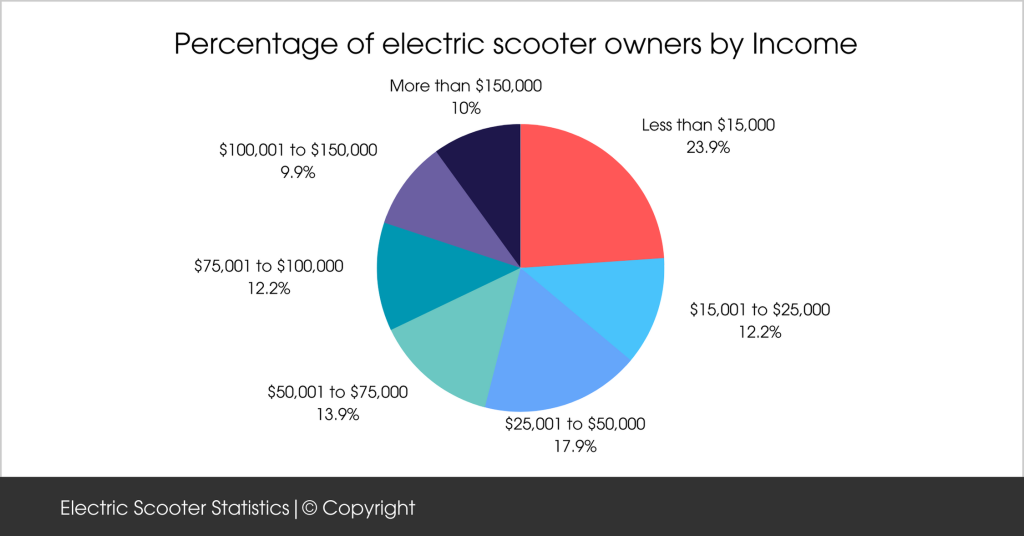
The following table shows the percentage of electric scooter owners by Income.
| Income | Share of Electric Scooter Owners |
| Less than $15,000 | 23.9% |
| $15,001 to $25,000 | 12.2% |
| $25,001 to $50,000 | 17.9% |
| $50,001 to $75,000 | 13.9% |
| $75,001 to $100,000 | 12.2% |
| $100,001 to $150,000 | 9.9% |
| More than $150,000 | 10% |
- The average age of electric scooter riders is 31 years.
Around 25% of Lime electric scooter users are 36 years or older, with an average age of 31.
Over 50% of riders fall between the ages of 25 and 44, while gender distribution is almost equal, with around 55% being male and 45% female.
- An average of 70% of people in the United States responded positively to electric scooters.
While 79% of Altana residents responded positively to electric scooters, and 21% had negative views.
Please refer to the table below for a breakdown of public perception of electric scooters in different US cities:
| City | Positive View | Negative View |
| Atlanta | 79% | 21% |
| Austin | 76% | 24% |
| Denver | 76% | 24% |
| Chicago | 75% | 25% |
| DC | 72% | 28% |
| Los Angeles | 71% | 29% |
| San Jose | 69% | 31% |
| Seattle | 68% | 32% |
| New York City | 67% | 33% |
| San Francisco | 52% | 48% |
- 72% of electric scooter users with an income less than $25K had positive views about electric scooters.
It’s worth noting that electric scooter users from all income groups gave more than 60% positive views about electric scooters.
For more detailed information on electric scooter users’ views, please refer to the table below:
| Income | Positive View | Negative View |
| Less than $25K | 72% | 28% |
| $25K to $50K | 75% | 25% |
| $50K to $100K | 69% | 31% |
| $100K to $200K | 66% | 34% |
| More than $200K | 64% | 36% |
Source: Appinventiv.
Electric Scooter-Sharing Statistics
If an individual is not interested in purchasing an electric scooter but still desires to use one, electric scooter-sharing can be a viable option. This allows for the rental of an electric scooter.
In this section, I have compiled statistics regarding electric scooter-sharing.
- The electric scooter-sharing market’s revenue reached $1,813 million in 2023.
From $10.78 million in 2017 to $1,813 million in 2023, the market’s revenue increased by $1802.22 million.
It is further forecasted to grow at a CAGR of 11.61% from 2023 to 2027.

This table shows the complete insights into the revenue of the electric scooter-sharing market from 2017 to 2027.
| Year | Revenue |
| 2017 | $10.78 million |
| 2018 | $220.90 million |
| 2019 | $769.30 million |
| 2020 | $1,041 million |
| 2021 | $1,384 million |
| 2022 | $1,540 million |
| 2023 | $1,813 million |
| 2024 | $2,041 million |
| 2025* | $2,295 million |
| 2026* | $2,559 million |
| 2027* | $2,812 million |
*Projected
- The average revenue per user of the electric scooter-sharing market is $19.83 as of 2024.
The average revenue per user of the electric scooter declined slightly in 2022. Before 2022, it was more than $20.
In 2017, the average revenue per user was $20.68, while in 2021, it was $20.57.
Industry experts predict that the average revenue per user will be $21.02 by 2027, which will be the highest of all time.
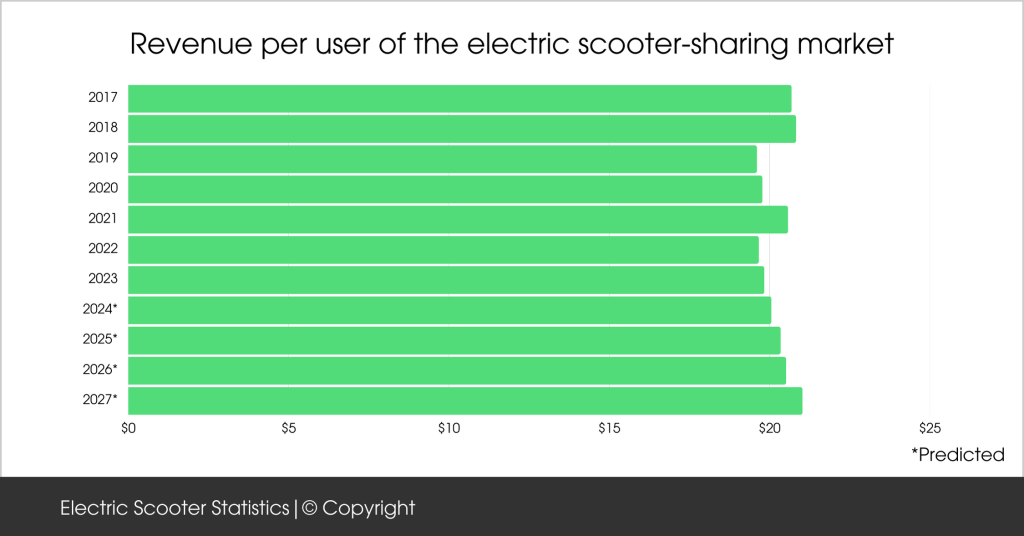
A table shows the average revenue per user of the electric scooter-sharing market from 2017 to 2027.
| Year | The Average Revenue Per User |
| 2017 | $20.68 |
| 2018 | $20.82 |
| 2019 | $19.60 |
| 2020 | $19.77 |
| 2021 | $20.57 |
| 2022 | $19.66 |
| 2023 | $19.83 |
| 2024* | $20.05 |
| 2025* | $20.34 |
| 2026* | $20.51 |
| 2027* | $21.02 |
Source: Statista.
Note: Looking to rent an electric scooter? Here are the best electric scooter rental services to help you find the best one for your needs.
Player of Electric Scooter Industry Statistics
The electric scooter industry has many players, but a few have emerged as key players. This section covers the top players in the industry.
1. Bird
- In the 1st quarter of 2023, Bird’s revenue was $29.5 million.
Bird, the pioneer of electric scooter market trends, achieved a remarkable valuation of $2 billion in just four months.
As compared to the fourth quarter of 2022, Bird generated $5.9 million less revenue. The fourth quarter of 2022, Bird’s revenue was $35.4 million.
- The net loss of Bird was $44.3 million in the first quarter of 2023.
In the fourth quarter of 2022, the net income of Bird was $7.7 million, but in the first quarter, Bird experienced a net loss.
- Bird generated $244.7 million in revenue in 2022.
In 2022, Bird generated 28% more revenue than in 2021 ($190.5 million)
Source: Bird.
2. Lime
- In 2022, Lime’s revenue was $466 million.
Lime, a trendsetter in the e-scooter industry, followed in Bird’s footsteps and achieved a valuation of $1.1 billion just 18 months after its initial launch. This fact demonstrates the rapid acceptance of this model by end users.
According to Move Electric, Lime received $466 million in gross booking, 33% more than in 2021. The EBITDA of Lime was $15 million in 2022.
Lime has raised 86% of its capital through electric scooter sales since debuting e-scooters.
- Lime gets $335 million in funding from Google and Uber.
Lime’s initial funding round amounted to $50 million, followed by a second round in February worth $70 million. This brought the company’s valuation to $132 million.
Source: Move Electric.
3. Skip
- Skip is valued at around $1 million.
Skip, one of the enthusiastic supporters of the E-scooter industry, was recently valued at around $1 million. According to reports, Skip generates $125k in revenue per employee.
4. JUMP
- JUMP raised $11.6 million in funding.
Uber acquired a brand, Jump, for $200 million to strengthen the micro-mobility market.
Jump has raised a total funding of $11.6 million and is estimated to earn $5 million in annual revenue, which is expected to grow with the expanding electric scooter industry.
Source: Appinventive.
Electric Scooter Investors and Valuation Statistics
In this section, I have gathered all the necessary statistics on investors and electric scooter valuations.
- Bird is a top investor in electric scooters, with $2 billion as of 2024.
Lime is the second highest investor in electric scooters with a whopping $1 billion, followed by Skip’s investment of $100 million.
The table shows the investments made by electric scooter companies:
| Investor | Investment |
| Bird | $2 billion |
| Lime | $1 billion |
| Skip | $100 million |
| Spin | $8 million |
- Lime raised $523 million in capital.
Of this funding amount, $418 million is made up of debt by the Abu Dhabi Growth Fund.
Bird secured $415 million in capital, leading the market, with Grin and Yellow following close behind with $270 million.
Vogo also raised $110 million in capital.
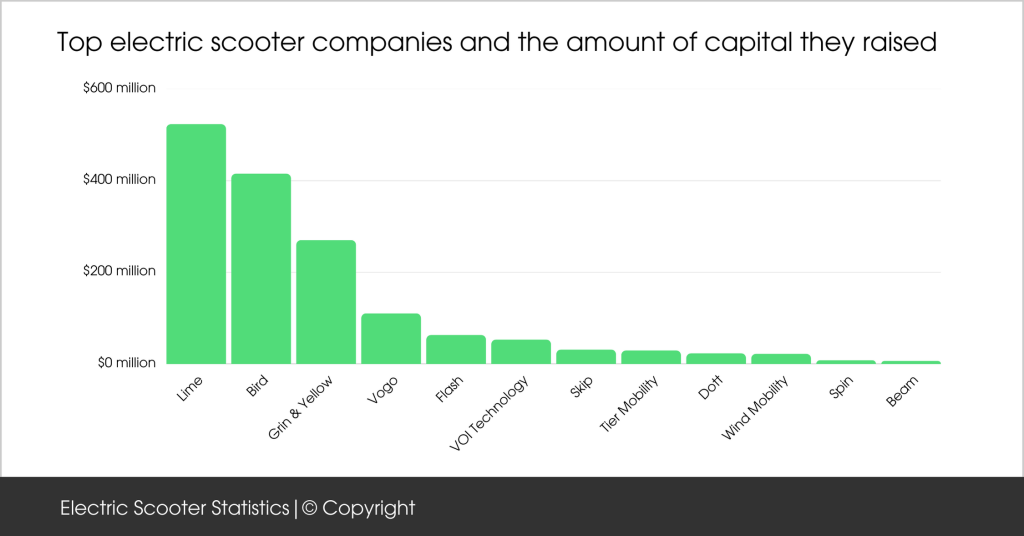
Please refer to the table below for a comprehensive list of the top electric scooter companies and the amount of capital they raised.
| Top Players | Capital Raised |
| Lime | $523 million |
| Bird | $415 million |
| Grin & Yellow | $270 million |
| Vogo | $110 million |
| Flash | $63 million |
| VOI Technology | $53 million |
| Skip | $31 million |
| Tier Mobility | $29 million |
| Dott | $23 million |
| Wind Mobility | $22 million |
| Spin | $8 million |
| Beam | $6.4 million |
Source: Appinventiv.
Cost of Electric Scooters
The cost of electric scooters varies by the different categories of electric scooters. In this section, I have gathered all the essential information about the cost of electric scooters.
- Electric scooters can be purchased for as low as $300.
The budget-friendly electric scooters come in a range of prices, from $300 to $800 for budget-friendly models.
However, for those seeking high performance, the cost increases accordingly.
Please refer to the table below for a comprehensive understanding of the electric scooter pricing.
| Category | Cost of electric scooter |
| Budget-friendly electric scooter | $300 to $800 |
| Regular Commuter Electric Scooter | $400 to $1,500 |
| Above-average and high-performing electric scooter | $1,600 to $2,500 |
| Extraordinary and high-performing electric scooter | More than $3,500 |
Source: Electron.
Note: Check out this article to learn more about the pricing of electric scooters. You will find a comprehensive guide that covers everything you need to know about the cost of electric scooters.
Electric Scooter System Statistics
The prevalence of electric scooter systems in the United States is rising yearly. In this section, I have gathered all the necessary information from the US Department of Transportation regarding electric scooter systems.
Let’s see it.
- 252 electric scooter systems are available in the United States as of 2024
In 2018, only 149 electric scooter systems were operating in the United States.
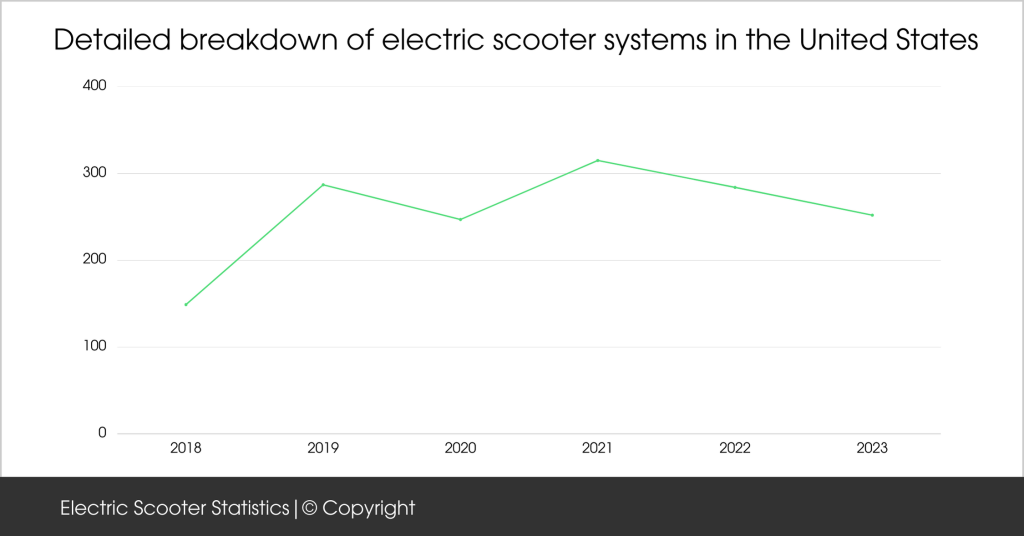
Please refer to the table below for a detailed breakdown of electric scooter systems in the United States over the years:
| Year | The Number of Electric Scooter Systems |
| 2018 | 149 |
| 2019 | 287 |
| 2020 | 247 |
| 2021 | 315 |
| 2022 | 284 |
| 2023 | 252 |
- Electric scooter systems are available in 156 cities in the United States.
In 2018, these systems were available in 67 cities, while in 2022, they were available in 172 cities.
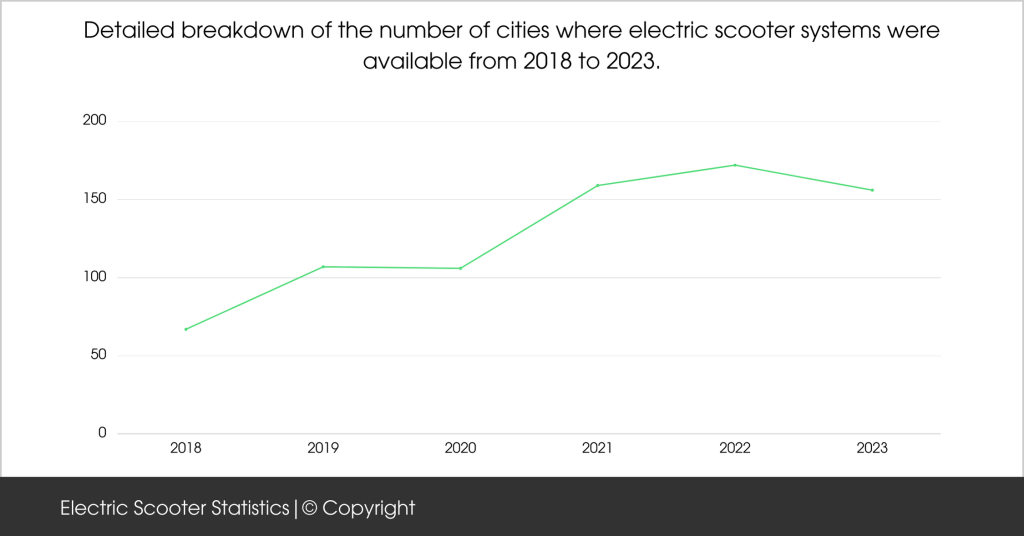
Please refer to the table below for a detailed breakdown of the number of cities where electric scooter systems were available from 2018 to 2023.
| Year | The Number of Cities Where Electric Scooter Systems Available |
| 2018 | 67 |
| 2019 | 107 |
| 2020 | 106 |
| 2021 | 159 |
| 2022 | 172 |
| 2023 | 156 |
Source: US Department of Transportation.
General Electric Scooter Statistics
Here are some general statistics about electric scooters to help you better understand this article.
- Between 2014 and 2018, there was a 222% increase in e-scooter-related injuries in the United States, with head injuries accounting for 27% of the total.
A study conducted by the CDC found that in 2019, 22% of all e-scooter-related injuries in the United States occurred among first-time riders.
However, research has demonstrated that many of these accidents can be prevented by wearing appropriate safety gear, following traffic laws, and staying aware of road conditions.
- Injuries related to using e-scooters, e-bikes, and hoverboards have increased by 70% over the past four years.
From 2017 through 2020, there were over 190,000 emergency room (ED) visits related to micromobility products.
ED visits increased steadily by 70%, from 34,000 in 2017 to 44,000 in 2018, 54,800 in 2019, and 57,800 in 2020.
The rise in visits from 2017 and subsequent years was primarily due to e-scooter-related incidents, which tripled from 7,700 in 2017 to 14,500 in 2018 and nearly doubled to 27,700 in 2019 before decreasing slightly to 25,400 in 2020.
- Electric scooters saved 5.6 million gallons of gas, reducing carbon emissions by 5% in the United States alone.
According to a study conducted by Portland State University, approximately 34% of e-scooter trips replaced car trips, thus reducing emissions in the city.
- Electric scooters have become a popular mode of transportation for millions of people each year.
E-scooters have become increasingly popular in recent years. Many cities in the United States and the United Kingdom have implemented scooter-sharing systems, allowing people to rent e-scooters for commuting in urban areas.
In 2019, there were approximately 88.5 million e-scooter trips in the United States, a significant increase from 38.5 million trips in 2018.
- Approximately 70% of respondents indicate electric scooters are viable transportation options.
Approximately 15% of respondents believe that scooters are a viable alternative to car trips.
Additionally, the number of individuals who have tried shared electric scooters has nearly doubled from 2019 to 2020.
Of those who used scooters, almost 50% reported using them for errands and social engagements.
Source: Consumer Product Safety Commission, Levy Electric.
Some Important Electric Scooter Statistics
Here are some brief yet crucial statistics regarding electric scooters. Let’s take a look.
- It is projected that by 2028, there will be 129 million units of electric scooters and motorcycles on the roads.
- By 2024, 8% of all two-wheelers on the road are expected to be electric.
- Between 2018 and 2019, the monthly installations of a scooter-sharing application increased by an impressive 580%.
- In 2019, 50 million electric scooters were registered.
- As of 2019, there were a total of 86,000 shared e-scooters available in 250 cities and towns throughout the United States.
- Electric scooters increased by 116% in Europe from 2018 to 2020.
- 28% of electric scooter users in the United States identify as first-time riders.
Source: Aniv, Levy Electric.
Related Articles:
- 30 MPH E-Scooter Reviews
- Can You Ride an Electric Scooter In The Rain?
- Electric Scooter Laws By States In The US In 2023
FAQs
In 2022, approximately 470,000 electric two-wheelers (primarily low-power e-scooters) were sold. IDTechEx predicts that sales will exceed 9 million units by 2043.
A higher percentage of men (22%) used e-scooters for work-related trips than women (15%). In contrast, women were more likely than men to use e-scooters for “fun/recreation” purposes.
Electric scooters are popular because it is an eco-friendly, affordable, and convenient mode of transportation for urban areas.
In the United States, electric scooters are primarily used in New York City, California, Illinois, Michigan, and Indiana.
Electric scooters are expensive because of their batteries, which can make up to 30% of their total price.

